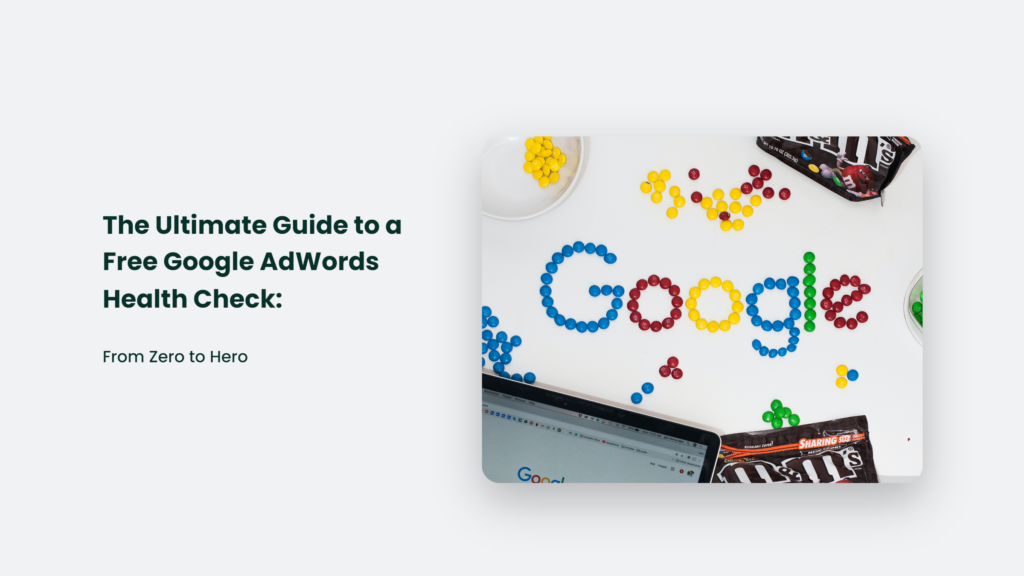You know you need it. You know you want it. But how do you get it?
Let me tell you a little story. Once upon a time, in a land not too far away, there was a business owner named Joe. Joe had dreams, ambitions, and a tiny marketing budget. He wanted to conquer the world (or at least his local market) with his amazing product. But Joe faced a problem: he didn’t know how to get his message out there.
One fateful day, Joe stumbled upon the mystical world of Google AdWords. As he dove headfirst into this digital realm, he quickly realized that great power comes great responsibility… and an even greater need for a health check.
“Wait, what’s a Google AdWords health check?” you might be asking. Well, hold your horses, an eager beaver! We’re about to embark on a magical journey to better understand this crucial digital marketing tool and how you can make the most of it – all for the low price of FREE. So, are you ready to learn how to do a Free Google AdWords Health Check?

Health Check, Schmealth Check – What’s the Big Deal?
“But, dear writer, what’s so important about a Google AdWords health check anyway?” I’m glad you asked, hypothetical reader!
Picture this: you’ve spent hours, maybe even days, crafting the perfect ad campaign. You’ve researched keywords, written witty ad copy, and set up a budget. And yet, despite your best efforts, the results are less “unicorn” and more “donkey.”
Why?
Simple. Your AdWords account is sick. It’s coughing up money without delivering the results you need. A Google AdWords health check is like a trip to the digital doctor – an opportunity to diagnose, treat, and prevent any ailments plaguing your account.
Still not convinced? Here are some fun facts for you:
- Did you know 61% of ad budgets are wasted on search terms that don’t convert? (Kissmetrics)
- A whopping 72% of PPC marketers don’t even know their Quality Score! (WordStream)
These numbers may be enough to make you go, “yikes,” but fear not! By the end of this guide, you’ll have the tools to perform your very own Google AdWords health check and become the marketing wizard you always knew you could be.
The Magical Checklist of Google AdWords Health
Alright, my young marketing Padawans, it’s time to roll up our sleeves and get down to business. Here’s a handy-dandy checklist of everything you need to look at during your Google AdWords health check:
- Keywords: Are you targeting the right ones? Are they too broad or too specific? Are they driving traffic that actually converts?
- Ad Copy: Is it engaging, relevant, and persuasive? Does it include a strong call-to-action?
- Landing Pages: Are they optimized for conversions? Do they match the intent of your keywords and ad copy?
- Quality Score: Are you keeping an eye on this crucial metric? Are you taking steps to improve it?
- Ad Extensions: Are you using them effectively to provide more information and encourage clicks?
- Bidding Strategy: Are you optimizing for clicks, conversions, or something else? Are you overspending or underspending on certain keywords?
- Negative Keywords: Are you using them to filter out irrelevant traffic and save money?
- Account Structure: Is your account well-organized with appropriate ad groups and campaigns?
Casting Spells and Slaying Dragons – How to Perform a Free Google Adwords Health Check

Now that you know what to look for, let’s dive into the nitty-gritty of performing a Google AdWords health check.
But first, a quick poll: On a scale of 1-10, how confident are you in your current AdWords account’s health? (1 = “I’m doomed,” 10 = “I’m basically a digital marketing deity.”)
Got your number? Great! Let’s get started.
Keywords: The Lifeblood of Your AdWords Account
Remember that scene in The Matrix where Neo learns how to dodge bullets? That’s the kind of finesse you need when selecting keywords for your campaigns. Make sure you’re:
- Using the right match types (broad, phrase, exact) to control when your ads appear
- Regularly analyzing search query reports to find new keywords and weed out irrelevant ones
- Checking conversion rates to ensure you’re focusing on keywords that actually drive results
Ad Copy: It’s All About the Words, Baby
Your ad copy is like the pick-up line of your campaign – it needs to be enticing, intriguing, and persuasive. Review your ads to ensure the following:
- They’re relevant to your keywords and landing pages
- They include a strong call-to-action (CTA) that compels users to click
- They’re using dynamic keyword insertion (where appropriate) to make ads feel more personalized
Pro tip: Don’t forget to test different versions of your ad copy to find the most effective message!
Landing Pages: Where the Magic Happens
Your landing page is the digital equivalent of a first date – you either seal the deal or send your potential customers running for the hills. Make sure your landing pages are:
- Designed to match the intent of your keywords and ad copy
- Optimized for conversions, with clear CTAs and easy navigation
- Mobile-friendly (because it’s 2023, people!
Quality Score: The Secret Sauce of AdWords Success
Your Quality Score is like the Hogwarts House of your ad campaign – a vital indicator of your account’s overall health. Keep an eye on the following:
- Click-through rates (CTRs), which directly impact your Quality Score
- Ad relevance, landing page experience, and expected CTR – the three components that make up your Quality Score
- Ways to improve your Quality Scores, such as refining your keywords and ad copy
Ad Extensions: It’s the Little Things That Count
Ad extensions are like the cherry on top of your AdWords sundae – they add extra information and make your ads more clickable. Be sure to:
- Use site link extensions to showcase additional pages on your website
- Add call extensions for mobile users who prefer to dial in directly
- Utilize structured snippet extensions to provide more context about your products or services
Bidding Strategy: It’s Not About Winning, It’s About Winning Smart
Your bidding strategy is the backbone of your AdWords account – it’s how you allocate your budget and get the most bang for your buck. Keep in mind:
- The importance of setting the right bidding strategy (manual, automated, or hybrid) for your goals
- Regularly reviewing your bids and adjusting them based on performance
- Considering different bidding strategies for different campaigns or ad groups, depending on their goals
Negative Keywords: The Art of Saying “No”
Negative keywords are like the bouncers at the exclusive club that is your AdWords account – they keep out the riff-raff and save you money. Don’t forget to:
- Regularly review search query reports to identify irrelevant search terms
- Add negative keywords at the campaign or ad group level to prevent wasted ad spend
Monitor performance metrics to ensure your negative keywords aren’t blocking valuable traffic.
Account Structure: A Place for Everything, and Everything in Its Place
Your account structure is like the foundation of your AdWords empire – it’s what keeps everything organized and efficient. Make sure you:
- Have separate campaigns for different product lines, services, or target audiences
- Create tightly themed ad groups with relevant keywords and ad copy
- Regularly review and update your account structure as needed to ensure optimal performance.
Frequently Asked Questions:
How often should I perform a Google AdWords health check?
A good rule of thumb is to conduct a health check at least once a quarter, but you may need to do it more frequently depending on your account’s performance and any changes to your business goals.
Can I perform a Google AdWords health check on my own, or should I hire an expert?
While it’s certainly possible to perform a health check on your own (especially with the help of this fabulous guide), enlisting the help of an expert can save you time and provide valuable insights you may not have considered.
What if my account is in really bad shape?
Don’t despair! Every AdWords account can be improved with some TLC. Use the insights from your health check to make data-driven decisions and watch your account’s performance soar.
How do I know if my Google AdWords health check was successful?
The proof is in the pudding, as they say. Monitor your account’s performance metrics (such as CTRs, conversion rates, and Quality Scores) to see if your changes have made a positive impact.
The Bottom Line:
And there you have it, folks! A comprehensive guide to performing a free Google AdWords health check. May your campaigns be ever prosperous, your keywords be ever relevant, and your Quality Scores be ever high. Now go forth and conquer the digital marketing world!




